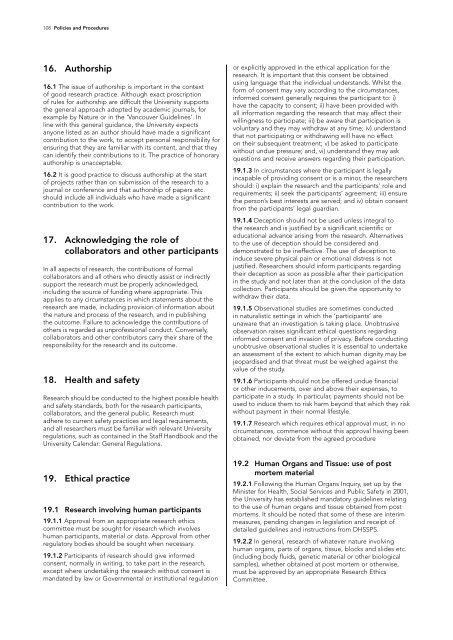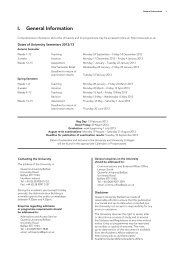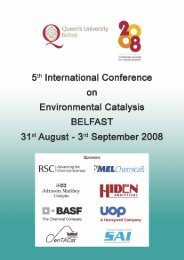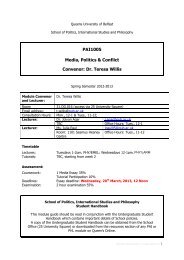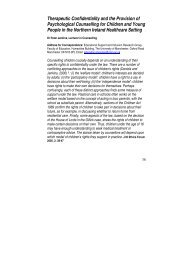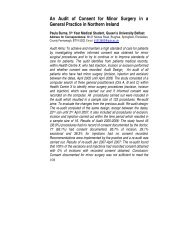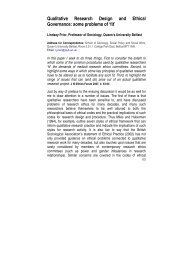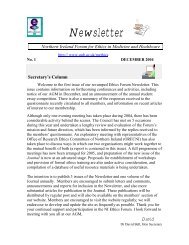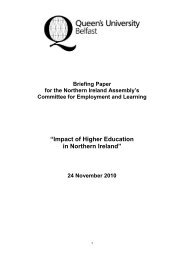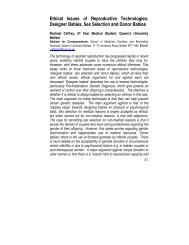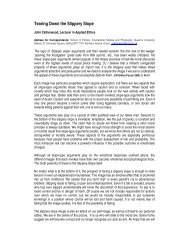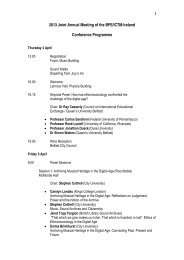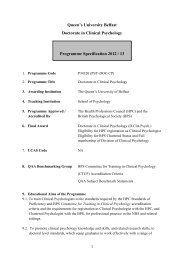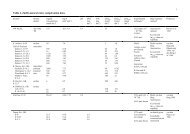University Calendar for Postgraduate Students 2012/13 - Queen's ...
University Calendar for Postgraduate Students 2012/13 - Queen's ...
University Calendar for Postgraduate Students 2012/13 - Queen's ...
You also want an ePaper? Increase the reach of your titles
YUMPU automatically turns print PDFs into web optimized ePapers that Google loves.
108 Policies and Procedures<br />
16. Authorship<br />
16.1 The issue of authorship is important in the context<br />
of good research practice. Although exact proscription<br />
of rules <strong>for</strong> authorship are difficult the <strong>University</strong> supports<br />
the general approach adopted by academic journals, <strong>for</strong><br />
example by Nature or in the ‘Vancouver Guidelines’. In<br />
line with this general guidance, the <strong>University</strong> expects<br />
anyone listed as an author should have made a significant<br />
contribution to the work, to accept personal responsibility <strong>for</strong><br />
ensuring that they are familiar with its content, and that they<br />
can identify their contributions to it. The practice of honorary<br />
authorship is unacceptable.<br />
16.2 It is good practice to discuss authorship at the start<br />
of projects rather than on submission of the research to a<br />
journal or conference and that authorship of papers etc.<br />
should include all individuals who have made a significant<br />
contribution to the work.<br />
17. Acknowledging the role of<br />
collaborators and other participants<br />
In all aspects of research, the contributions of <strong>for</strong>mal<br />
collaborators and all others who directly assist or indirectly<br />
support the research must be properly acknowledged,<br />
including the source of funding where appropriate. This<br />
applies to any circumstances in which statements about the<br />
research are made, including provision of in<strong>for</strong>mation about<br />
the nature and process of the research, and in publishing<br />
the outcome. Failure to acknowledge the contributions of<br />
others is regarded as unprofessional conduct. Conversely,<br />
collaborators and other contributors carry their share of the<br />
responsibility <strong>for</strong> the research and its outcome.<br />
18. Health and safety<br />
Research should be conducted to the highest possible health<br />
and safety standards, both <strong>for</strong> the research participants,<br />
collaborators, and the general public. Research must<br />
adhere to current safety practices and legal requirements,<br />
and all researchers must be familiar with relevant <strong>University</strong><br />
regulations, such as contained in the Staff Handbook and the<br />
<strong>University</strong> <strong>Calendar</strong>: General Regulations.<br />
19. Ethical practice<br />
19.1 Research involving human participants<br />
19.1.1 Approval from an appropriate research ethics<br />
committee must be sought <strong>for</strong> research which involves<br />
human participants, material or data. Approval from other<br />
regulatory bodies should be sought when necessary.<br />
19.1.2 Participants of research should give in<strong>for</strong>med<br />
consent, normally in writing, to take part in the research,<br />
except where undertaking the research without consent is<br />
mandated by law or Governmental or institutional regulation<br />
or explicitly approved in the ethical application <strong>for</strong> the<br />
research. It is important that this consent be obtained<br />
using language that the individual understands. Whilst the<br />
<strong>for</strong>m of consent may vary according to the circumstances,<br />
in<strong>for</strong>med consent generally requires the participant to: i)<br />
have the capacity to consent; ii) have been provided with<br />
all in<strong>for</strong>mation regarding the research that may affect their<br />
willingness to participate; iii) be aware that participation is<br />
voluntary and they may withdraw at any time; iv) understand<br />
that not participating or withdrawing will have no effect<br />
on their subsequent treatment; v) be asked to participate<br />
without undue pressure; and, vi) understand they may ask<br />
questions and receive answers regarding their participation.<br />
19.1.3 In circumstances where the participant is legally<br />
incapable of providing consent or is a minor, the researchers<br />
should: i) explain the research and the participants’ role and<br />
requirements; ii) seek the participants’ agreement; iii) ensure<br />
the person’s best interests are served; and iv) obtain consent<br />
from the participants’ legal guardian.<br />
19.1.4 Deception should not be used unless integral to<br />
the research and is justified by a significant scientific or<br />
educational advance arising from the research. Alternatives<br />
to the use of deception should be considered and<br />
demonstrated to be ineffective. The use of deception to<br />
induce severe physical pain or emotional distress is not<br />
justified. Researchers should in<strong>for</strong>m participants regarding<br />
their deception as soon as possible after their participation<br />
in the study and not later than at the conclusion of the data<br />
collection. Participants should be given the opportunity to<br />
withdraw their data.<br />
19.1.5 Observational studies are sometimes conducted<br />
in naturalistic settings in which the ‘participants’ are<br />
unaware that an investigation is taking place. Unobtrusive<br />
observation raises significant ethical questions regarding<br />
in<strong>for</strong>med consent and invasion of privacy. Be<strong>for</strong>e conducting<br />
unobtrusive observational studies it is essential to undertake<br />
an assessment of the extent to which human dignity may be<br />
jeopardised and that threat must be weighed against the<br />
value of the study.<br />
19.1.6 Participants should not be offered undue financial<br />
or other inducements, over and above their expenses, to<br />
participate in a study. In particular, payments should not be<br />
used to induce them to risk harm beyond that which they risk<br />
without payment in their normal lifestyle.<br />
19.1.7 Research which requires ethical approval must, in no<br />
circumstances, commence without this approval having been<br />
obtained, nor deviate from the agreed procedure<br />
19.2 Human Organs and Tissue: use of post<br />
mortem material<br />
19.2.1 Following the Human Organs Inquiry, set up by the<br />
Minister <strong>for</strong> Health, Social Services and Public Safety in 2001,<br />
the <strong>University</strong> has established mandatory guidelines relating<br />
to the use of human organs and tissue obtained from post<br />
mortems. It should be noted that some of these are interim<br />
measures, pending changes in legislation and receipt of<br />
detailed guidelines and instructions from DHSSPS.<br />
19.2.2 In general, research of whatever nature involving<br />
human organs, parts of organs, tissue, blocks and slides etc.<br />
(including body fluids, genetic material or other biological<br />
samples), whether obtained at post mortem or otherwise,<br />
must be approved by an appropriate Research Ethics<br />
Committee.


